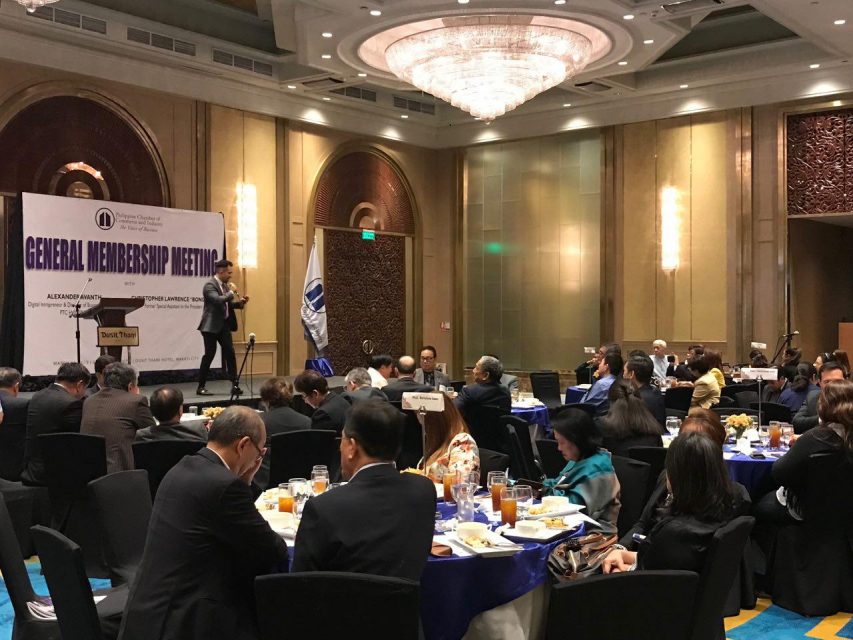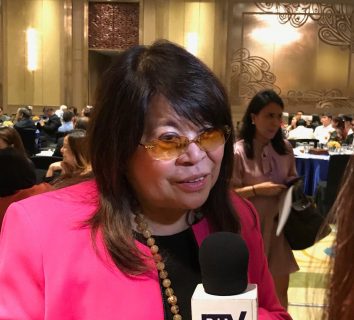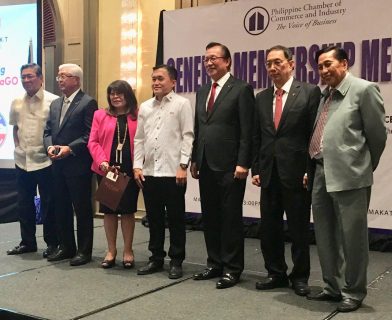
By Caesar Vallejos
OPEN FOR BUSINESS, Eagle News Service
Members of the Philippine Chamber of Commerce and Industry (PCCI) were urged to rethink their policies and strategies to prepare their businesses for the transformation that the digital revolution is bringing.
“Workers, businesses and the government must prepare for the transformation,” PCCI President Ma. Alegria Limjoco said in her speech at the PCCI General Membership Meeting held at the Dusit Thani Hotel last March 12, 2019.
The evolution of technology and the transformation of work and work systems have been termed the fourth industrial revolution, also known as the 4IR or the Industry 4.0.
“4IR is characterized by the fusion of technologies that will disrupt not just the way we operate businesses but even systems of governance and the way we live,” Limjoco said.

The PCCI President said that this ushered in “disruptive technologies –digital innovation and new technologies that are redefining the business landscape, transforming how work gets done, who or what does the work and even how the workplace operates.”
Blockchain, artificial intelligence and smart manufacturing were some of the topics covered in the previous PCCI business conference. “There are other emerging technologies that we were unable to cover – financial technology, drones, robotics, #D printing, Internet of Things, etc – new concepts and technologies that will significantly affect our approach to business,” Limjoco said.
Three lenses to see the future
“If you go along the business as usual, unusual business will enter your industry,” Alexander Avanth, Director for Business Innovations of the PTC Holdings Corporation said.
He cited three different lenses to see the future and its possibilities. He enumerated exponential acceleration, creative crossings and paradigm shift as the three different perspectives to see what is going on and what will happen in the future.
He emphasized that the acceleration of technology will be faster than today. “Technology is faster than you think and if you wait until you could see that it is dangerous, it is too late,” Avanth said.
As this happens, “we as consumers change, our value systems change the consequence is that all businesses face a paradigm shift. All businesses with operations based on second or third industrial revolution cannot compete because there is a completely new value proposition from the consumer.”
“So the question about innovation and disruption is not [if] you can afford it, but it is if you can afford not to do it,” Avanth said.
He mentioned that “every company faces a critical point that it must dramatically change to rise to the next level of performance. The key is courage.”
The fast fish
Avanth also cited that “we are beginning to glimpse the bare outlines of the new economic system entering into the world stage called ‘collaborative commons’, which means that we are stronger together.”
“In the new world, it’s not the big fish that eats the small fish, it’s the faster fish that eats the slower fish.” Avant recalled that in 2012, Kodak, with 3,000 employees, declared bankruptcy with a deficit of US12 billion on the same day that Instagram was acquired for US 1 billion dollars by Facebook. “They have 13 employees. This is the power of the fast fish,” Avanth stressed.
Avanth encouraged PCCI members to invest in infrastructure and energy including solar energy that will “leapfrog the industry”.
While he cited the importance of technology, Avanth stressed that “human resources will still be at the frontier of a competitive advantage in the 21st century.”

Some strategies for an exponential world that Avanth suggested include: creating meaning beyond the bottomline and solving worldly problems; scalable learning; learning coding and decoding; critical thinking; supporting entrepreneur and intrapreneur; creating uncommon partnerships and moonshooting.
Ironically, Avanth mentioned that one of the strategies to thrive in the connected exponential world is to ‘disconnect’ – prioritizing life balance and time offline.
Also a speaker at the PCCI gathering was Special Assistant to the President, Christopher Lawrence “Bong” Go who spoke about the Philippine’s booming economy.
“I credit the robust growth and the generally optimistic outlook for the economy to three crucial factors: the solid demographics fundamentals of the economy, the dynamism of the private sector and the strong leadership of the Duterte administration and its economic managers,” Go said.
He said that gave the programs that gave profound impact in spurring the next stage of our economic development include the government’s Build Build Build program, the Ease of Doing Business Act, the Pondo sa Pagbabago ar Pag-asenso Program, the Telecommuting Act, the Negosyo Centers and the MSME Development Plan.







